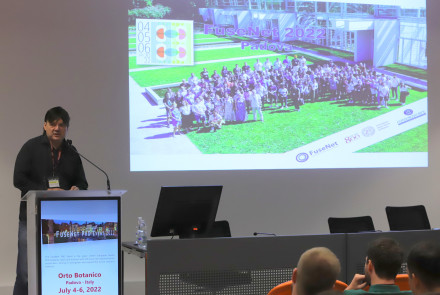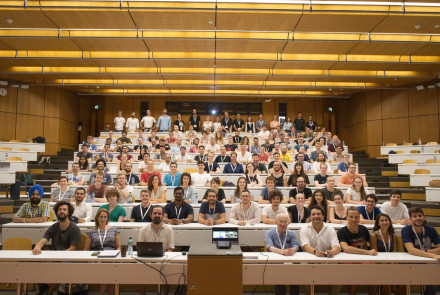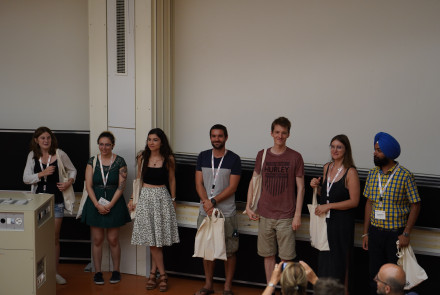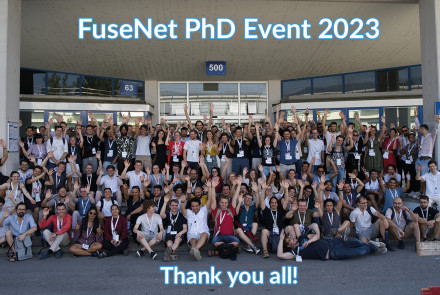New Max Planck - Princeton Partnership in fusion research
The Max Planck Society is strengthening its commitment to the development of a sustainable energy supply and has joined forces with internationally renowned Princeton University to establish the Max Planck Princeton Research Center for Plasma Physics.
[[{"type":"media","view_mode":"media_large","fid":"693","attributes":{"class":"media-image","id":"1","typeof":"foaf:Image"}}]]
The new Center’s partners in the field of fusion research are the Max Planck Institute for Plasma Physics in Garching and Greifswald (IPP) and the Princeton Plasma Physics Laboratory (PPPL). In the field of astrophysical plasmas, the MPI for Solar System Research (Katlenburg-Lindau), the MPI for Astrophysics (Garching) and Princeton University’s Department for Astrophysical Sciences are also involved. “The aim of the cooperation is to make greater use of the synergies between fusion research and the work carried out by the astrophysicists,” explains Sibylle Günter, Director of the MPI for Plasma Physics. For example, it has emerged that many methods developed by fusion research are also applicable for astrophysics.
All of the partners on both the German and American sides have extensive experience in the fields of fusion research and astrophysics, and complement each other in different ways. The IPP is working on a Tokamak experiment in Garching, which is based on the design of the international experimental fusion reactor ITER. The IPP researchers are also building the Wendelstein 7-X Stellarator in Greifswald, and the PPPL has already contributed hardware for this project. Given that the PPPL is very interested in stellarator physics but is not carrying out an experiment of its own in this area, Günter assumes that this cooperation will intensify further with the establishment of the new Center. The PPPL, which is the leading institute in the field of fusion research in the US, operates a spherical Tokamak and carries out laboratory experiments on general plasma physics, a topic that is also researched in Greifswald. The partners from the Max Planck Society and Princeton University would like to avail of their respective experimental systems and develop new theoretical models and codes in the context of the new Center.
The new Center is one of ten Max Planck Centers that are currently being established at nine locations throughout the world.
The Max Planck Princeton Research Center for Plasma Physics will promote the exchange of scientists, in particular junior scientists. To this effect, the scientists could cooperate on an experiment campaign at the corresponding other institute or work jointly on the development of computer programs.
The Max Planck Society is inviting applications for several PhD students’ and postdoctoral fellowships available for the Max Planck Princeton Research Center for Plasma Physics, aiming at the improved understanding of crucial phenomena in magnetic fusion as well as in space/astrophysical plasmas. The aim of the center is to exploit commonalities between these areas of fundamental research. Topics of the center are magnetic reconnection, turbulence in astrophysical and fusion plasmas, supra-thermal particles, and the role of magnetic fields in astrophysical problems.
The research work will be carried out at facilities located in Berlin, Garching (Bavaria) and Greifswald (Mecklenburg-Western Pomerania) in Germany. The applicant may also spend a part of the time at the Princeton Plasma Physics Laboratory. Applicants for postdoc fellowships must hold a doctorate and have the documented ability to carry out novel research. Experience in plasma physics and/or astrophysics are welcome.
She/he will be offered a tax-free stipend for two years (with a possibility of a one-year extension depending on the success of the research and funding of the project) according to the regulations of the Max-Planck Society, i.e. the payment will depend somewhat on the experience of the applicant and on her or his family circumstances.
The application should include a curriculum vitae and a full list of publications. Attached should be a short (one-page) letter describing your strengths and your qualification for the above described topics. Please provide also the names of two scientists willing to provide letters of reference and submit your application as soon as possible, but not later than the June 1st to Jutta Koser (jutta.koser@ipp.mpg.de), Max-Planck-Institut für Plasmaphysik, Boltzmannstr. 2, 85748 Garching bei München (Germany).





